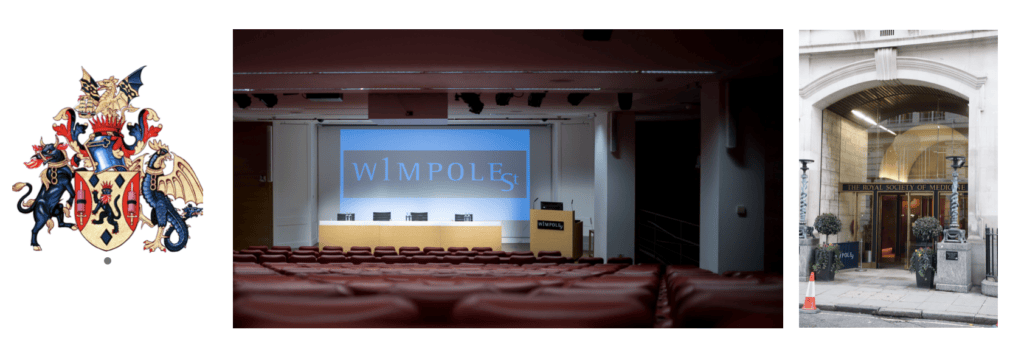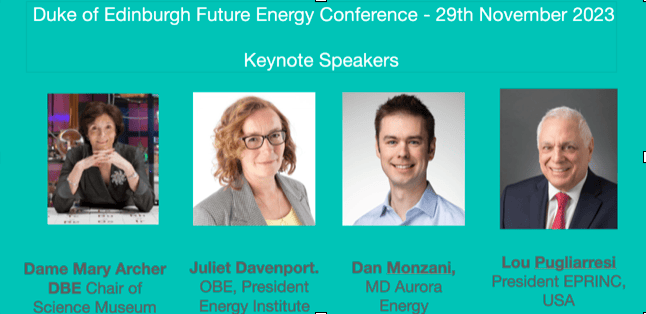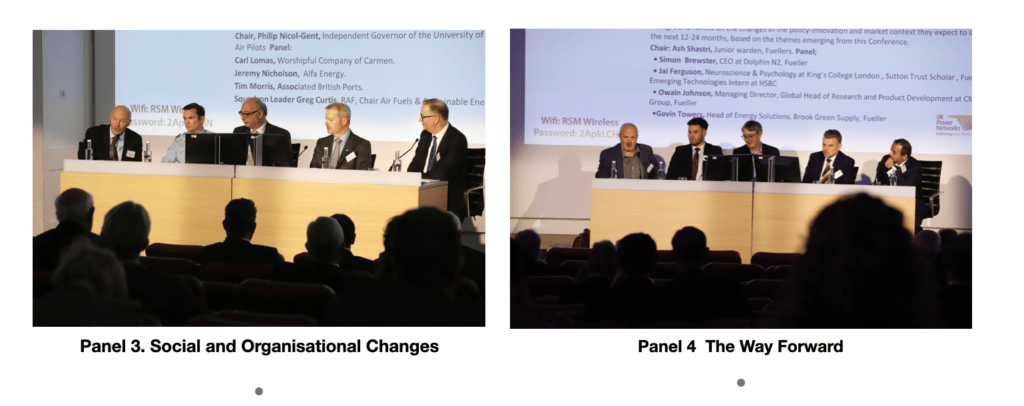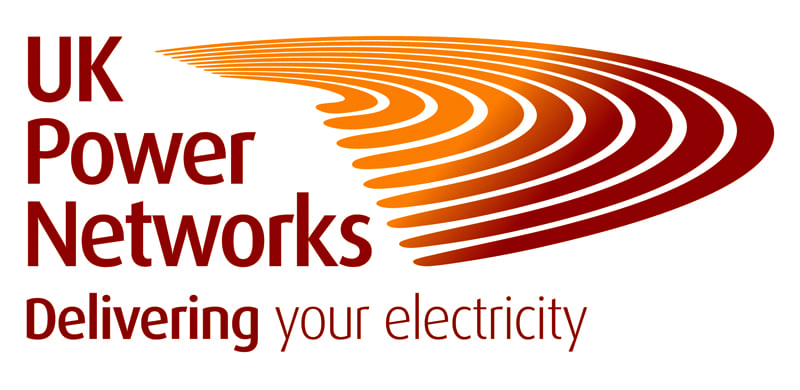Duke of Edinburgh Future Energy Conference 29th November 2023, Royal Society of Medicine, London
The Keynote Presentations and Take Aways

This summary, is being posted on the Fuellers Linkedin page, and the Fuellers Conference Website in order to capture the key take aways of the Duke of Edinburgh Future Energy Conference 2023 while it is still fresh in everyone’s minds.
We invite our members and others who attended the Conference to provide their insights and learnings from it, which we will post here as key take aways. Please email the conference organisers, or via the Contact Us page. Any further comments will be useful for the next conference in two years time.
Keynote Addresses.
(Speaker’s permission to publish has been received)
First, there are the links to the keynote address for your perusal. You will find these as follows
09.40 - Keynote Speaker 1 – Energy Outlook – A Perspective from the United States - Lucian Pugliaresi, President Energy Policy Research Foundation, USA. 10:05 (view presentation)
11.25 – Keynote Speaker 2 – Energy Outlook – A British Perspective (including the regulatory) technical challenges we face) – Juliet Davenport, OBE, President Energy Institute. (view presentation)
14.15. Keynote Speaker 3 - Energy Outlook - Dame Mary Archer DBE, Chair of the Board of the Science Museum (view presentation)
17:00 – Keynote 4 – The Big Picture, Dan Monzani, Managing Director for UK and Ireland, Aurora Energy. (view presentation)
Biographies of all speakers. (link to speakers’ biographies)

Morning Panel Sessions

The Take Aways
All attendees are asked to provide additional take aways by either emailing the conference organisers, via the Contact Us page or posting comments on Linkedin.
General The panel replies were energetic and focused. A straw pole found 25% of audience own an electric vehicle; none of them said they would return to a petrol or diesel vehicle.
Panel 1 Take Aways
Reliable electricity and Cost Crisis. 45% of people around the world do not have access to reliable electricity. Need to invest in grid infrastructure and double the spend.The energy cost crisis is affecting the entire climate policy. Russia/Ukraine war changed the dial and made all countries look at security of supply and demand to produce more of their own energy.
Intermittent supply and Nuclear. intermittent supply (from wind and solar) is more expensive for the DSOs, and a reference to ‘inexhaustible doesn’t mean inexpensive.
Nuclear today (Hinkley) and tomorrow's (Fusion One) – What’s is the Fuellers take on nuclear?
Carbon emissions There should be a cost placed on carbon. Fossil fuels worldwide, still at 80% but are about to decline. The move of natural gas and coal to green is not going to happen overnight. Carbon tax, carbon price is a no brainer, but the social reality is that support from people must be forthcoming; increased green jobs, less asthma are an incentive.
Heating homes, the future and government legislation
We will heat houses in the future in very different ways, hydrogen will feature strongly, Heat Networks : the government is bringing in zoning where homes in a zone are required (regulations) to connect to a heat network Fuellers asked to comment on this forthcoming regulation for home owners and building managers?
Renewables. Miracle fall of wind and solar to an affordable price. Installation rose by a sixth last year; half of that growth was in China.The Netherlands has twice as much solar than the whole of Africa.
Driver for Change. Coal to oil was driven by Industrial transformation but today change is been driven by customer choice. High carbon need communities will be the last to leave the fossil market. There is a place for AI and the future virtual power plant. Do Fuellers agree?
Energy efficiency and demand reduction. Engage and educating the consumer. Focus on demand reduction and efficiency not legislation– individuals together can reduce demand by 50% -Need to help customers better control their energy consumption. How should this be done?
Panel 2.Take Aways. Innovation
Panel Presentations
Richard Huff, Founder Hydrogen One. (view presentation)
Paul Spence, Strategy and Logistics, Nuclear Fission, EDF (view presentation)
Jason Frost, Carbon Capture and Storage, Aker. (link to presentation)
Transition The transition is happening. Innovation is not linear and 2050 is not the end. ‘We need to remove carbon from the atmosphere at scale. The world of engineering and digital sciences must exploit the innovations being made.
Hydrogen– Green hydrogen explained and spoke. Large a micro hydrogen and ammonia production and usage technologies is being developed. ‘Its happening all over the World. UK a little slow on hydrogen but it is a real solution.
Nuclear The world needs to move towards nuclear now and tomorrow, from ‘fission to fusion. The technical challenges suggests fusion always seems thirty years away, but the 35 country ITER project to build the complicated engineering is a step forward.
Carbon Capture Bespoke carbon capture plants required for fossil fuel plant. Direct capturing of carbon from the atmosphere is costly using a lot of energy, but bio-energy capture is another project underway in Denmark with Microsoft support.
Afternoon Panel Sessions

Panel 3. Take Aways- Social and Organisational Changes
The transition must be just, and panel accepts that re-skilling is required. London air emission schemes are a turning point in city transport.
Maritime is messy with many players, but opportunities for replacement fuels are growing. Similarly, synthetic fuels for air transport are a turning point.
EV’s are imposing challenges on infrastructure.
Partnerships with Industry are the future for some Military Developments (e.g. Rolls Royce/RAF). Military land and infrastructure offer opportunities for renewables.
EV may not be the answer for HGVs but blending diesel is expanding. Recycling of batteries - recycling process..
Panel 4 Take Aways - The Way Forward
Energy efficiency and EV infrastructure need improving.
Market trading of rare earth metals important but weather products is the fastest growth market.
Grid needs massive reinforcing and improved data processing to satisfy demand,
Biomass offers solutions in agro-sector but planning for the future is inadequate.
A gap in supply of gigawatts, caused by the lack of grid connections. The focus is on offshore wind. The most efficient energy you use is the energy you do not use.
Takeaways identified in Keynote 4 - the Big Picture, How Well are we doing? New Added 3rd January 2024
Takeaway 1: Despite recent policy missteps, deployment of renewables has been a GB success story. More progress is needed on electrification of transport and (especially) heat.
Takeaway 2: There is a pivotal debate now about the extent to which system integration can be most efficiently and speedily achieved through central planning or market design.
Takeaway 3: Consumer costs are not bound to rise inexorably. There are real choices about efficiency and fairness that will determine the costs of the transition and who bears them.
Sponsors of the DOE 2023 Fuellers Conference. - UK Power Networks




